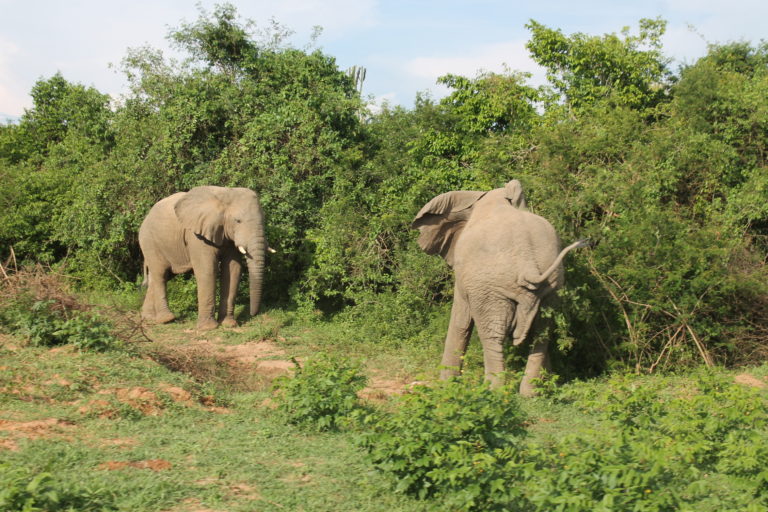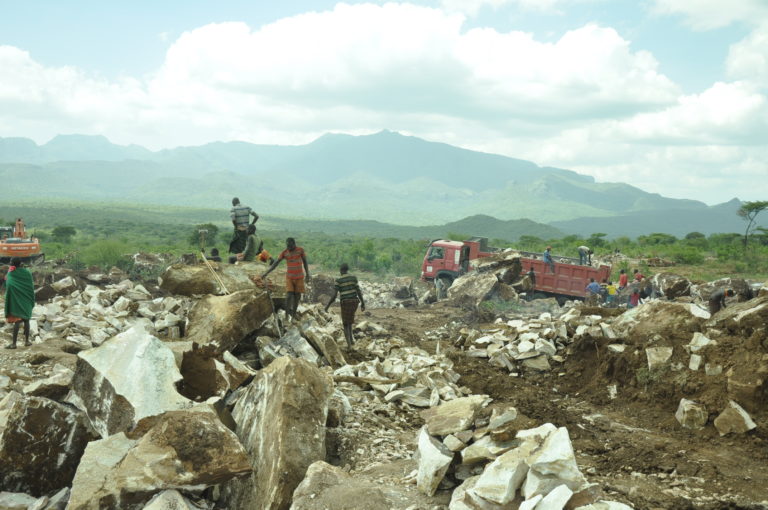BULIISA, Uganda — Baboons wander through shrub-lands that line the sides of newly built roads straddling Uganda’s wildlife reserves close to the shores of oil-rich Lake Albert. Across the border in Congo, magnificent lush green hilly countrysides stand out. If you’re lucky you can catch a glimpse of elephants too. Wildlife is abundant here, but such scenes might be no more in a few years, as oil companies embark on multi-billion projects to pump as much as 6 billion barrels of crude oil from Uganda’s biodiversity-rich Albertine Rift Graben.

This territory has also been occupied for generations by the indigenous Bagungu people, who tilled the land to cultivate millet and sorghum and gather medicinal herbs and fish on Lake Albert. The Bagungu have over the years used traditional techniques to conserve the lands. From restricting access to sacred areas to designating wildlife sanctuaries, owing in part to a traditional belief that nature and its resources are guarded by spirits.
But planned development of hundreds of oil wells that dot the shores of lake Albert poses new threats to the pristine environment and has come at the expense of indigenous people’s rights. The Bagungu have been uprooted from ancestral grounds and their once revered cultural sites destroyed—including shrines and grazing lands.

“We have lost our grazing lands. Our people wish oil had not been discovered in this area,” Alex Wakitinti the chief custodian of sacred sites of the Bagungu, says, pointing at a newly built highway. “We no longer have access to medicinal herbs and sacred trees where we worshiped.”
French oil giant TotalEnergies operates the Tilenga oil project in the remote districts of Buliisa, Hoima, Kikuube, and Nwoya near the ecologically fragile Murchison Falls National Park and the Nile Delta in western Uganda. The project consists of six oil fields and is expected to have 400 wells drilled in 31 locations. It will also house an industrial area, support camps, a central processing facility, and feeder pipelines. The project necessitates the acquisition of 2,901 acres of land across the districts, as well as additional land within the national park.

According to Petroleum Authority Uganda, the process of acquiring land for the Tilenga project is still underway and has displaced 5,523 families. Residents and local officials, however, say that this process has been marred by inadequate and delayed compensation and resettlement.
Three years ago, TotalEnergies, approached Kaliisa Munange, a peasant farmer in kasenyi village, in Buliisa district, near the shores of lake Albert with a proposal. They would take over his 6-acre piece of land for project developments, in exchange for a bigger chunk of land, complete with a house, in a nearby village. With the promise of a better life, Mr. Munange consented to a relocation that he thought would be life-changing.
“When I arrived, I was so disappointed all the promises were empty, yet the company had already taken over my property,” he said, frowning his forehead with anger. “It was very far, there wasn’t a nearby school that my children would attend and the hospital is ten kilometers away. I decided to take them to court but up to now there is no decision.”

Kaliisa’s is not the only case. His plight is shared by thousands of peasants in this lakeside village, which will soon house one of the largest oil processing facilities in Africa. Many have been waiting for compensation for several years since they were ordered not to plant any perennial crops and erect permanent structures on their land.

locals are nostalgic of the good old days when they had a source of livelihood tilling their land and fishing freely from L. Albert. When the land was communally used for grazing, worship, herbal medicines, and building materials.
“Community involvement and participation in the land acquisition process and environment impact assessment processes has been limited,” says Wakitinti “Our people were not involved in the identification of cultural sites and a number of medicinal herbs and trees were not assessed for compensation.”
Total executives deny the allegations insisting that the company is addressing the complaints of the affected people and has even been providing them with supplies, such as food.

Pauline Macronald, head of the environment biodiversity at TotalEnergies Uganda says that the project is taking measures to ensure the socioeconomic stability of project-affected persons.
“TotalEnergies is committed to developing the Tilenga project while observing human rights standards and International Finance Corporation performance standards,” she said, adding that the company has been in close contact with project-affected people to minimize the projects’ impact on locals.
The constitution of Uganda safeguards property rights and land ownership. It affirms that everyone has a right to possess property and offers strict protection against unfair property deprivation. This states that everyone whose private property or land must be acquired for a public project should get prompt, fair, and reasonable compensation.
The International Finance Corporation Performance Standard 7 aims to guarantee that corporate operations minimize adverse effects and promote respect for indigenous peoples’ cultures, rights, and dignity. A fundamental criterion is the free, prior, and informed permission of indigenous peoples, as well as informed consultation and engagement with them throughout the project development process. The Bagungu, however, contend that these rights and standards have been violated by oil project developers.
“The land acquisition processes for oil projects have been shrouded in secrecy, no transparency. The processes have not been participatory and consultative in nature and any project resistance has resulted in costly formal court proceedings to the indigenes,” says Enoch Bigirwa, the former chairperson of the Bagungu Community Association.
The Bagungu Community Association BACA is a local group championing the rights of Bagungu amidst oil developments in their territory. It exists for the sociology-cultural and economic development of Bagungu. BACA is part of the environmental groups that filed a lawsuit against TotalEnergies in France over human rights violations and environmental harm in its Uganda oil project.
Who are the Bagungu
The Bagungu are an indigenous tribe native to Uganda and totaling around 83,986 according to the 2014 population census. They are mainly found in Buliisa, Hoima, and Masindi districts of western Uganda-Albertaine Graben. They belong to the historical Bunyoro Kingdom led by an Omukama, their King.

They are agricultural and fishing folk. Bagungu are the guardians and custodians of Lake Albert, a large freshwater lake that is the the source of Albert Nile, a branch of the River Nile that flows through Uganda, Rwanda, South Sudan, Tanzania, Burundi, Kenya, and DR Congo.
Oil Developments in Uganda
In 2006, oil and gas reserves were discovered in Uganda’s Albertine Graben.TotalEnergies and China’s CNOOC recently reached a final investment decision to inject $10 billion to kick start oil developments in partnership with the government of Uganda through Uganda National Oil Company which will subsequently lead to production in 2023. Output is expected to peak at 220,000 barrels a day of crude, Uganda consumes around 15,000 barrels a day of crude. Part of the crude oil will be refined to supply the local market while the remainder will be exported through a 1,443km buried East African Crude Oil Pipeline EACOP from Uganda to the Indian Ocean port of Tanga in Tanzania for export to the international market.
Uganda envisions the development of the oil and gas industry will accelerate economic growth, and job creation, improve the general prosperity of Ugandans and catapult the country into middle-income status. Petroleum Authority of Uganda estimates that about 200,000 people will be employed in the oil and gas sector.
However, climate campaigners have been opposing oil developments in the country citing environmental issues, climate change, and community rights violations. As a result, financiers of fossil fuel projects like banks, insurers, and other financial players have been urged to refrain from providing financial support for oil projects.
“Biodiversity is seriously threatened by Total’s oil operations. Government should encourage green economic investments in clean energy. These are inclusive and have the greatest multiplier effects on employment,” said Diana Nabiruma, the communications officer, at Africa Institute for Energy Governance.
This story was produced with the support of Internews’ Earth Journalism Network’s Indigenous Story Grants



















